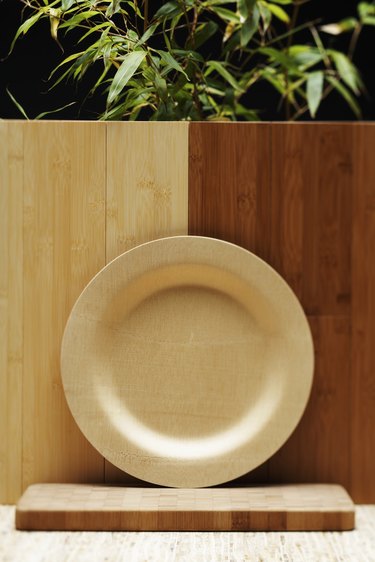 Bamboo has several of the same uses as wood. Image Credit: Thomas Northcut/Photodisc/Getty Images
Bamboo has several of the same uses as wood. Image Credit: Thomas Northcut/Photodisc/Getty Images
Bamboo is a good substitute for wood in some instances. Bamboo is a strong, lightweight grass that can grow up to 50 inches per day, depending on the species. Because the tensile strength of wood and bamboo are comparable, architects and engineers are discovering new uses for the grass.
Video of the Day
Measuring Tensile Strength
Tensile strength is the force required to pull or stress an object before it breaks. As you pull the object, it increases in tensile direction, but the object's volume remains constant. Three factors help determine tensile strength: yield strength, breaking strength and ultimate strength. Yield strength is the amount of stress an object can undergo without any permanent deformations. Breaking strength refers to a coordinate on a stress-strain curve representing the point of breaking or rupture. Ultimate strength is the maximum amount of stress an object can withstand. Strength is sometimes measured in pounds per square inch, psi, or in megapascals, Mpa, which is the amount of Newtons or units of force divided by the object's total area in square millimeters.
Tensile Strength of Bamboo
On average, bamboo with a density of .04 g per cubic centimeter has a yield strength of 142 Mpa and an ultimate strength of 265 Mpa. The strongest bamboo can have an ultimate tensile strength of 500 Mpa. According to "Newsweek," some forms of bamboo have a tensile strength exceeding that of steel. Bamboo's flexibility and its ability to absorb impacts are beneficial for the construction of homes in windy areas or those that experience earthquakes. Moreover, when wet, the tensile strength of bamboo increases by up to 20 percent.
Tensile Strength of Wood
Wood is orthotropic and anisotropic, as its tensile strength differs by direction. Its greatest tensile strength is parallel to the grain. Tensile strength perpendicular to the wood grain, where wood often splits, is low. Soft woods can have a tensile strength of around 300 psi, while hard woods can have a tensile strength up to 2,800 psi, according to Wood Works Web.
Considerations
Many tensile strength values depend on the purity, composition and manufacturing process of wood and bamboo. Factors, such as insect damage, fungus and rot, influence the tensile strength of both natural materials. Additionally, the fact that bamboo reeds are hallow makes it difficult to create strong joints and more vulnerable to fire damage.


